The Primary Functions of a Water Chiller for MRI Systems Include:
1. Maintaining the Low Temperature of the Superconducting Magnet: Water chillers circulate ultra-low-temperature cooling water to provide the necessary low-temperature environment for the superconducting magnet.
2. Protecting Other Critical Components: Besides the superconducting magnet, other parts of the MRI machine, such as the gradient coils, may also need cooling due to the heat generated during operation.
3. Reducing Thermal Noise: By controlling the temperature and flow rate of the cooling water, water chillers help reduce thermal noise during MRI operations, thereby enhancing image clarity and resolution.
4. Ensuring Stable Equipment Operation: High-performance water chillers ensure that MRI machines operate at their optimal state, extend the lifespan of the equipment, and provide accurate diagnostic information for doctors.

TEYU Water Chillers Offer Reliable Cooling Solutions for MRI Machines
High-Precision Temperature Control: With temperature stability of up to ±0.1℃, TEYU water chillers ensure that the MRI machine operates stably under strict temperature requirements.
Low Noise Design: Suitable for quiet and enclosed medical environments, TEYU water chillers utilize water-cooled heat dissipation to effectively reduce noise, minimizing disturbance to patients and staff.
Intelligent Monitoring: Supporting the Modbus-485 communication protocol, TEYU water chillers allow remote monitoring and adjustment of water temperature.
The application of water chillers in the medical device field provides robust support for the normal operation of MRI and other equipment. Features like precise temperature control, efficient cooling, reliability, and ease of maintenance ensure that medical equipment operates in its best condition, delivering high-quality medical services to patients.
Source: https://www.teyuchiller.com/why-do-mri-machines-need-water-chillers